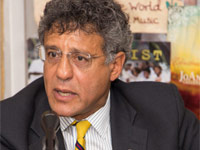WASHINGTON, DC – The Bahamas on Tuesday signed a joint agreement to cooperate with hemispheric partners on the implementation of the project “Promoting Firearms Marking in Latin America and the Caribbean,” giving the country access to training and equipment for marking firearms and tracking them.
Ambassador Cornelius Smith, Permanent Representative of The Bahamas to the Organisation of American States (OAS), called the project “very important for [The Bahamas] because we have become a transit point for drugs and small arms.”
“The marking of firearms helps us identify the weapons that have been used in criminal activity, and therefore helps to combat crime in the region,” he added.
Other parties to the cooperation agreement were the General Secretariat of the OAS (GS/OAS) and the governments of Costa Rica, Paraguay and Uruguay. Together with The Bahamas, these are the first five countries to sign such an agreement in the framework of the Inter-American Convention against the Illicit Manufacturing and Trafficking in Firearms, Ammunition, Explosives and Related Materials (CIFTA).
The CIFTA posit that marking firearms helps to combat illicit firearms trafficking as it allows authorities to identify the seized weapons to determine their origin. Through this agreement, the OAS aims to strengthen national capacities in illicit firearms trafficking and provide marking equipment and training to beneficiary countries.
Per the cooperation agreement, the OAS agreed to provide a marking machine and its accessories to the Ministry of National Security for the execution of the project, and provide training on the use of the equipment. These assets, once delivered, become the property of the Government of The Bahamas.
The Bahamas, in turn, is obligated to provide the GS/OAS with information on the country’s capacities and needs with respect to firearms marking, recording and tracing. The Bahamas also agreed – among other things – to cooperate with the GS/OAS on follow-up missions and to mark an average of 100 firearms per month for the first 12 months after receiving the machine and its accessories.
During the signing ceremony, OAS Secretary General José Miguel Insulza affirmed the organisation’s intent to develop and strengthen national capacities of the cooperating countries to combat illicit-arms trafficking through different tools: providing advice on the development of model legislation, exchange of best practices, gathering and analysing statistical information, and offering technical assistance among them.
Representatives of the governments of Costa Rica, Paraguay and Uruguay also called for the issue to be considered a major scourge that must be faced by every nation. The project is being funded by the United States. US Permanent Representative, Ambassador Carmen Lomellin, encouraged Member States to continue implementing measures to combat this scourge.
“Concrete steps by individual countries and collective steps by regional and international organisations can go a long way through combating arms trafficking,” she said.
By Khyle Quincy Parker
Press Attaché Embassy of The Bahamas


